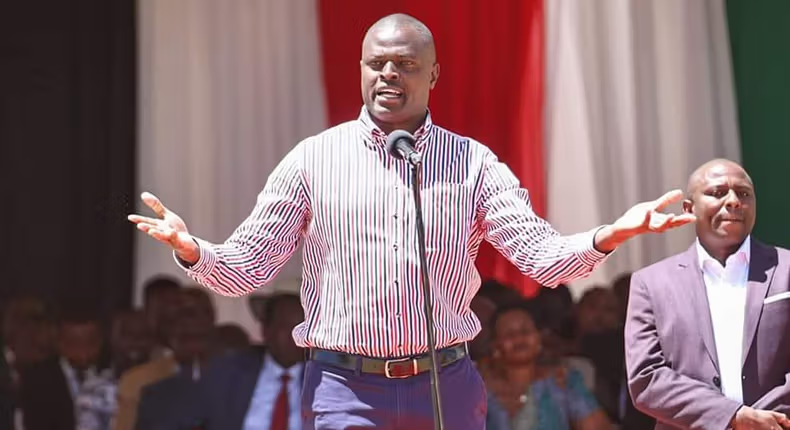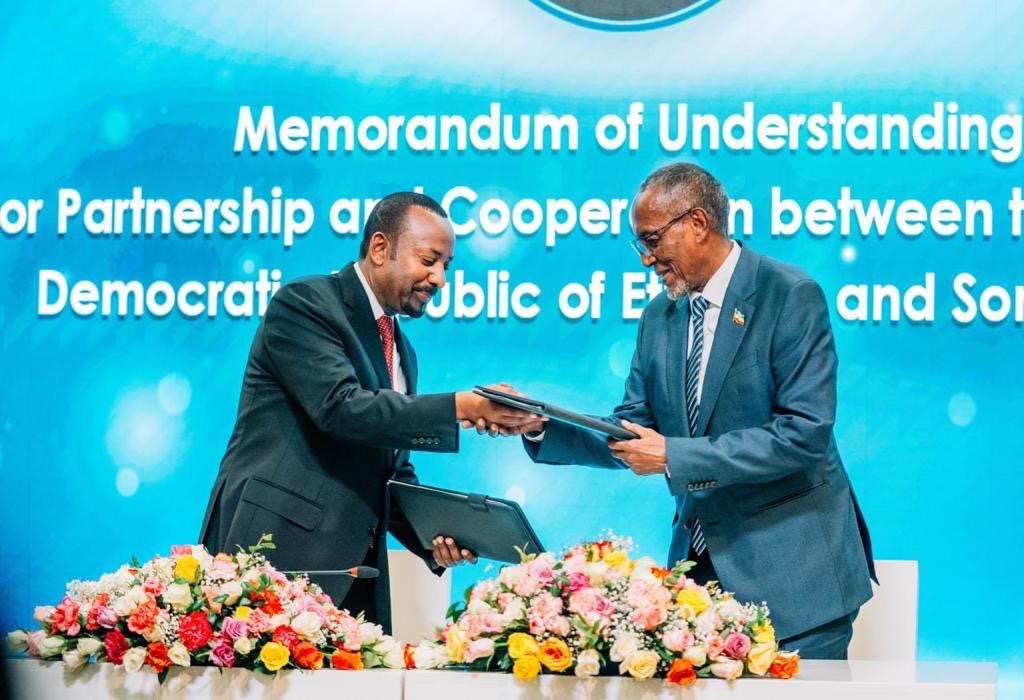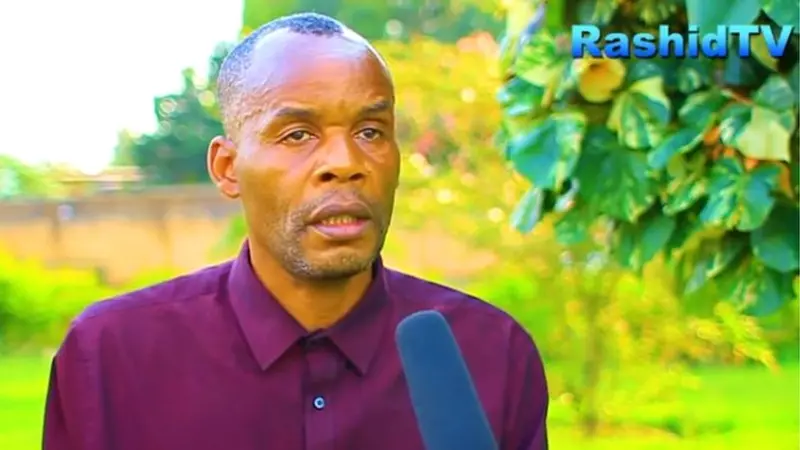Politics
Ndindi Nyoro Aims to Replace Gachagua as Mt Kenya Leader
Ndidi Nyoro is a popular MP in his Muranga political base, found in Central Kenya and his youthfulness is an asset. But time will tell if, his local popularity suffices to propel him to a higher office.

:Nyoro’s ambition stems from personal ambition, regional political dynamics, and external influences. His goals align with a broader generational shift in Kenyan politics, where younger leaders increasingly seek to supplant the old guard.
By Charles Wachira
Kenyan politician Ndindi Nyoro has emerged as a significant figure within the Mt Kenya region. He has openly stated his ambition to replace Deputy President Rigathi Gachagua as the political leader of this crucial voting bloc. This analysis delves into Nyoro’s political background, the forces propelling his ambition, his chances of succeeding, and the broader implications for Mount Kenya’s political landscape.
Political Background of Ndindi Nyoro
Ndindi Nyoro was born on December 12, 1985, in Murang’a County. He pursued his education at Kenyatta University, earning a degree in economics. His career began in the private sector, where he founded various successful businesses, including stock brokerage and construction firms. The turning point in Nyoro’s political career came when he was elected to the Kiharu Constituency in 2017. Since then, he has utilised this position to establish himself as a steadfast supporter of President William Ruto’s economic agenda and an outspoken opponent of opposition politics.
His candidacy has marked Nyoro’s ascent to political prominence, ability to organise at the grassroots level, and support for the United Democratic Alliance (UDA). His ability to connect with the youth and articulate the aspirations of his constituents has garnered him significant support within the region.
Ambition to Replace Deputy President Rigathi Gachagua
Nyoro’s ambition to become the Mt. Kenya political supremo stems from personal ambition, regional political dynamics, and external influences. His goals align with a broader generational shift in Kenyan politics, where younger leaders increasingly seek to supplant the old guard.
Personal Ambition and Vision:
Nyoro has consistently demonstrated a strong desire to ascend the political ladder. His assertive and often confrontational style resonates with a segment of the electorate that feels disillusioned with traditional politics.
Support from Key Figures and Constituencies:
According to reports, influential people in the UDA and the larger Mt. Kenya region are pushing Nyoro because they think he is a new and exciting leader. This support includes business leaders, youth groups, and sections of the clergy who favour his economic vision and grassroots approach.
Strategic Positioning:
Nyoro has strategically positioned himself as a loyal supporter of President William Ruto, aligning his political narrative with the administration’s economic policies. This alignment enhances his appeal among Ruto’s supporters in Mt. Kenya, positioning him as a natural successor to Gachagua.
Chances of Success
Nyoro’s chances of successfully replacing Rigathi Gachagua as the Mt Kenya political supremo depend on several factors:
Grassroots Support:
Nyoro has built a solid grassroots base, particularly among the youth and business community. His mobilisation of this support will be crucial in challenging Gachagua’s established influence.
Political Endorsements:
Securing endorsements from key political figures and stakeholders within Mt. Kenya and the broader Kenyan political landscape will significantly bolster his chances. The backing of President Ruto would be particularly pivotal.
Performance and Public Perception:
Nyoro’s track record as MP for Kiharu and his performance in articulating and advocating for regional interests will influence public perception. His ability to address local issues effectively can sway undecided voters in his favour.
Regional Dynamics:
The Mt. Kenya region is politically complex, with diverse interests and factions. Navigating these dynamics requires astute political manoeuvring and coalition-building skills, areas where Nyoro will need to excel.
Challenges and Opposition:
Gachagua’s incumbency and established networks present significant challenges. Gachagua’s ability to deliver on promises and maintain his support base will be a formidable obstacle for Nyoro.
Conclusion
Ndindi Nyoro’s ambition to replace Deputy President Rigathi Gachagua as the Mt Kenya political supremo reflects the ongoing generational shift and evolving political landscape in Kenya. With strong grassroots support, strategic alliances, and a clear vision, Nyoro has positioned himself as a viable contender. However, his success will depend on his ability to navigate the complex regional dynamics, secure influential endorsements, and effectively address the aspirations of the Mt Kenya electorate. The coming years will be crucial in determining whether Nyoro can translate his ambition into tangible regional political leadership.
Politics
Kenyan Man Convicted in U.S. for 9/11-Style Terror Plot
In pre-trial documents, prosecutors stated that Cholo Abdi Abdullah planned to sit passively during the proceedings, accepting the outcome without challenge, as he viewed the court as an illegitimate system.
In pre-trial documents, prosecutors stated that Abdullah planned to sit passively during the proceedings, accepting the outcome without challenge, as he viewed the court as an illegitimate system.
In pre-trial documents, prosecutors stated that Abdullah planned to sit passively during the proceedings, accepting the outcome without challenge, as he viewed the court as an illegitimate system.
In pre-trial documents, prosecutors stated that Abdullah planned to sit passively during the proceedings, accepting the outcome without challenge, as he viewed the court as an illegitimate system.

: Kenyan man convicted of plotting 9/11-style attack for al-Shabab. Federal jury finds him guilty on all counts; sentencing set for March 2025.
A Kenyan man was convicted on November 4 of plotting a 9/11-style attack on a U.S. building on behalf of the terrorist organisation al-Shabab.
A federal jury in Manhattan, US, found Cholo Abdi Abdullah, 34, guilty on all six counts he faced for conspiring to hijack an aircraft and slam it into a building, according to court records.
He’s due to be sentenced next March and faces a mandatory minimum of 20 years in prison.
Abdullah represented himself during the trial, which opened last week. He declined to give an opening statement and did not actively participate in questioning witnesses.
In court papers filed ahead of the trial, prosecutors said Abdullah intended to “merely sit passively during the trial, not oppose the prosecution and whatever the outcome, he would accept the outcome because he does not believe that this is a legitimate system.”
Lawyers appointed to assist Abdullah in his self-defence didn’t respond to an email seeking comment Monday.
Federal prosecutors, who rested their case Thursday, said Abdullah plotted the attack for four years, undergoing extensive training in explosives and how to operate in secret and avoid detection
He then moved to the Philippines in 2017 where he began training as a commercial pilot.
Abdullah was almost finished with his two-year pilot training when he was arrested in 2019 on local charges.
He was transferred the following year to U.S. law enforcement authorities, who charged him with terrorism-related crimes.
Prosecutors said Abdullah also researched how to breach a cockpit door and information “about the tallest building in a major U.S. city” before he was caught.
The State Department in 2008 designated al-Shabab, which means “the youth” in Arabic, as a foreign terrorist organisation. The militant group is an al-Qaida affiliate that has fought to establish an Islamic state in Somalia based on Shariah law.
Keywords: Kenyan man convicted:9/11-style attack plot:al-Shabab terrorism: U.S. federal jury verdict: Terrorism charges
Politics
Ethiopia-Somaliland Deal: Maritime Access and Recognition
Ethiopia’s recognition of Somaliland could have significant ramifications. Regional powers such as Djibouti, Eritrea, and various Arab states with interests in the Red Sea corridor are approaching this development with caution. Somalia, which considers Somaliland part of its territory, strongly opposes this move, fearing that Ethiopia’s support may inspire other secessionist movements and undermine its territorial integrity

: Ethiopia signs a historic deal with Somaliland for naval access, becoming the first nation to recognise it as an independent state, stirring regional tensions.
A groundbreaking agreement signed on January 1, 2024, between Somaliland—a self-declared state within Somalia—and Ethiopia could allow Ethiopia access to naval and commercial port facilities on the Red Sea.
In return, Ethiopia would officially recognize Somaliland as an independent nation, making it the first country globally to do so.
This Memorandum of Understanding (MoU), signed by Ethiopian Prime Minister Abiy Ahmed and Somaliland President Muse Bihi Abdi in Addis Ababa, is anticipated to reshape regional dynamics and has already sparked geopolitical tensions across the Horn of Africa, an area marked by conflict and complex alliances.
For Ethiopia, which is landlocked, the deal offers significant strategic advantages, providing direct access to the Red Sea for the first time since Eritrea’s independence in 1993.
This access would enhance Ethiopia’s trade routes and bolster its security capabilities in a critical maritime region, reducing its heavy reliance on Djibouti’s port, currently its primary outlet to the sea.
This MoU also marks a significant diplomatic milestone. If it proceeds, Ethiopia’s recognition of Somaliland’s sovereignty would be the first of its kind from any country in Africa or worldwide, potentially setting a precedent that could inspire other countries.
The official recognition would likely bolster Somaliland’s long-standing bid for international legitimacy; since declaring independence in 1991, it has sought recognition without success, remaining unrecognized under international law.
However, the implications of Ethiopia’s recognition of Somaliland could be far-reaching. Other regional powers, including Djibouti, Eritrea, and several Arab states with vested interests in the Red Sea corridor, view this development with caution.
Somalia, which claims Somaliland as part of its territory, is particularly opposed, fearing that Ethiopia’s endorsement could embolden other secessionist movements and threaten Somalia’s territorial integrity.
Additionally, regional players worry that this agreement could destabilize the Horn of Africa by challenging existing borders and emboldening separatist sentiments in other areas.
As Ethiopia navigates its next steps in this high-stakes diplomatic and strategic initiative, the deal’s impact on Somalia’s territorial unity, the stability of the Red Sea region, and Ethiopia’s role in regional geopolitics remains to be seen. The international community is watching closely as this landmark agreement unfolds, potentially reshaping alliances and fueling new tensions in one of Africa’s most volatile regions.
Keywords: Ethiopia Somaliland deal: Maritime access: Somaliland recognition: Horn of Africa tensions: Geopolitical implications
Politics
Rwandan YouTuber Rashid Hakuzimana Sentenced to 7 Years
Hakuzimana’s case underscores the persistent sensitivities surrounding the Rwandan genocide, which claimed the lives of around 800,000 people—mostly Tutsis and moderate Hutus—within a mere 100 days at the hands of Hutu extremists. Although the Rwandan Patriotic Front (RPF), primarily composed of Tutsis, brought the genocide to an end, it has faced accusations from human rights organizations of carrying out retaliatory killings of Hutus during its rise to power—claims that the RPF-led government staunchly denies.

Rashid Hakuzimana, a Rwandan YouTuber, faces seven years in prison for genocide denial and inciting division, highlighting tensions in post-genocide Rwanda.
Rashid Hakuzimana, a prominent Rwandan YouTuber, has been sentenced to seven years in prison for violating the country’s laws on genocide denial.
The 56-year-old, who identifies as a Hutu, was arrested in 2021 and has consistently denied all charges against him.
These charges include inciting ethnic division and spreading false information by claiming that anyone who challenges President Paul Kagame in elections faces imprisonment.
Hakuzimana’s case highlights the ongoing sensitivities surrounding the Rwandan genocide, during which approximately 800,000 people, predominantly Tutsis and moderate Hutus, were killed in just 100 days by Hutu extremists.
The Rwandan Patriotic Front (RPF), mainly comprised of Tutsis, ended the genocide but has faced accusations from human rights groups of retaliatory killings of Hutus as they took power—allegations the RPF-led government vehemently denies.
During his trial, the judge cited Hakuzimana’s YouTube remarks as incendiary, particularly his suggestion that genocide orphans received less care than children of senior government officials.
Such statements, the judge argued, contributed to fueling divisions within Rwandan society. “Your comments are not just opinions; they are divisive and harmful,” the judge stated.
Hakuzimana, who represented himself in court, refused to mount a defense, insisting he be addressed as a politician rather than a YouTuber.
He expressed frustration over his three years in jail, stating, “I’ve spent enough time behind bars for merely expressing my thoughts on my platform.”
Following the ruling, Hakuzimana will serve four years in prison, as the three years he has already spent in custody will be counted towards his sentence. He was also fined $700 (£500). It remains uncertain if he will appeal the decision.
Human rights organizations have criticized Kagame’s government for allegedly using genocide denial laws to suppress dissent, a claim the government denies.
In a notable instance from last year, another YouTuber, Yvonne Idamange, had her 15-year sentence extended by two years for inciting violence and spreading false information.
In court, Hakuzimana argued that his criticism of the government on his popular YouTube channel, Rashid TV, was the true reason for his arrest. “My videos were not about denying the genocide; they were about holding the government accountable,” he explained.
Under Rwandan law, it is a criminal offense to deny, downplay, or attempt to justify the genocide. Hakuzimana, who frequently appeared on Ishema TV and his own channel, had previously been warned by the Rwandan Investigation Bureau (RIB) to moderate his rhetoric but did not comply.
In one of his final videos, he controversially suggested scrapping the annual commemoration of the genocide, stating, “Hutus wronged the Tutsi, yes, but if you have forgiven someone, you don’t need to remind them every year that ‘you killed my people.’ That is not forgiveness; ‘Kwibuka’ should be scrapped off.”
Hakuzimana’s case underscores the complex and delicate nature of discussing Rwanda’s past, a legacy that continues to shape the nation’s political landscape today.
Keywords:Rashid Hakuzimana:Rwandan YouTuber:genocide denial:Paul Kagame:ethnic division
-

 Business & Money7 months ago
Business & Money7 months agoEquity Group Announces Kshs 15.1 Billion Dividend Amid Strong Performance
-

 Politics2 months ago
Politics2 months agoFred Okengo Matiang’i vs. President William Ruto: A 2027 Election Showdown
-

 Politics4 months ago
Politics4 months agoPresident Ruto’s Bold Cabinet Dismissal Sparks Hope for Change
-

 Politics4 months ago
Politics4 months agoKenya Grapples with Investor Confidence Crisis Amid Tax Protest Fallout
-

 Politics1 month ago
Politics1 month agoIchung’wah Faces Mt. Kenya Backlash Over Gachagua Impeachment Support
-

 Politics3 months ago
Politics3 months agoJohn Mbadi Takes Over Kenya’s Treasury: Challenges Ahead
-

 Politics1 month ago
Politics1 month agoMwengi Mutuse: The Political Maverick or Master of Contradiction?
-

 Politics4 months ago
Politics4 months agoPresident Ruto’s Lavish Spending Amid Kenya’s Economic Struggles Sparks Outrage














